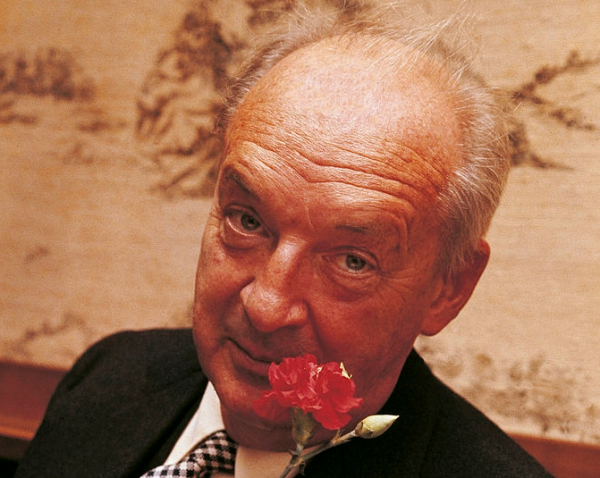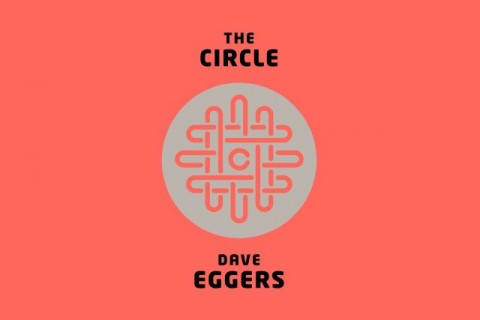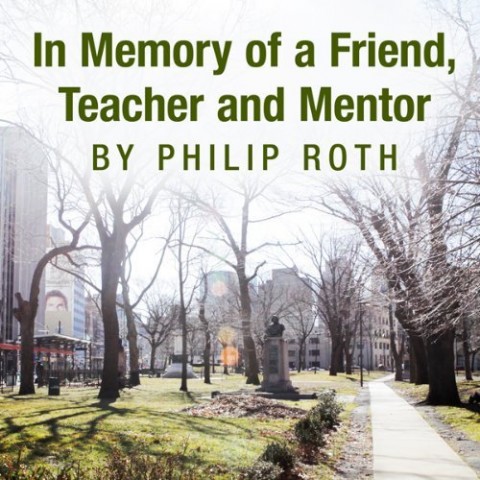Dave Eggers, author of A Heartbreaking Work of Staggering Genius, has a new book coming out in early October, The Circle, a novel about “a young woman who goes to work at an omnipotent technology company and gets sucked into a corporate culture that knows no distinction between work and life, public and private.” Breaking with tradition, The New York Times has placed the novel’s cover on the cover of its own Sunday Magazine. It has also printed a lengthy excerpt from the book. Read it online here, or listen right below (or on iTunes) to a reading of the excerpt by actor Don Graham. It runs 46 minutes.
Hear Vladimir Nabokov Read From the Penultimate Chapter of Lolita

Image by Giuseppe Pino, via Wikimedia Commons
There may be no more a despicable yet ridiculous narrator in twentieth century fiction than the sleazy, condescending Humbert Humbert. And there may be no better name in twentieth century fiction than Dolores Haze, Humbert’s 12-year-old stepdaughter and love interest, whom he calls, among other things, his “nymphette,” Lolita.
Vladimir Nabokov’s tragicomic 1955 novel Lolita still has the power to shock, disgust, and elicit wry laughter from readers, with its satirical take on decadent old Europe and wisecracking young America. True to its mid-century U.S. setting and sensationalistic subject matter, the novel is packed not only with Humbert’s obsessively creepy description and layers of literary allusion, but also with plenty of pulpy action, if we are to believe in the events Humbert narrates.
In the novel’s penultimate chapter, Humbert tracks down Clare Quilty, another predatory older man who takes advantage of Lolita. Humbert confronts, then kills Quilty (or so it seems). In the final chapter, Humbert also dies, and we learn that the novel is in fact his memoir, willed only to be published after he and Lolita have died. In the audio clip at the top, hear Vladimir Nabokov himself read from the climactic chapter in which Humbert faces Quilty down, and directly above, see the author read those first unforgettable lines: “Lolita, light of my life, fire of my loins. My sin, my soul. Lo-lee-ta.”
Find more recordings of Nabokov reading his work here.
Note: You can download essential works by Vladimir Nabokov as free audiobooks (including Jeremy Irons reading Lolita) if you sign up for a free 30 Trial with Audible. Find more information on that program here.
Related Content:
Vladimir Nabokov on Lolita: Just Another Great Love Story?
Vladimir Nabokov Marvels Over Different “Lolita” Book Covers
Josh Jones is a writer and musician based in Durham, NC. Follow him at @jdmagness
Download a Free Course from “The Great Courses” Through Audible.com’s Free Trial Program

Hardly a day goes by where I’m not doing one of two things — listening to an audio book from Audible.com, or listening to a lecture from The Great Courses (formerly known as The Teaching Company). So, I was naturally pleased when the two companies announced a partnership yesterday. From now on, Audible subscribers can download courses/lectures from The Great Courses, and they’re pretty cheap. For example, members of Audible’s Gold plan can purchase a polished 36-hour course, such as How to Listen to and Understand Great Music, for roughly $15. Not bad, especially considering that it would cost exponentially more to buy it directly through the Great Courses’ web site. If you’ve never tried out Audible or The Great Courses, then you may want to sign up for Audible’s 30-Day Free Trial. It will let you download any one course for free. NB: Audible is an Amazon.com subsidiary, and we’re a member of their affiliate program.
If none of the above sounds any good, well, you could always lose yourself in our collections of 900 Free Audio Books and 1700 Free Online Courses from Top Universities.
Related Content:
Download 90 Free Philosophy Courses and Start Living the Examined Life
Learn to Code with Harvard’s Intro to Computer Science Course And Other Free Tech Classes
The Art of Living: A Free Stanford Course Explores Timeless Questions
150 Free Online Business Courses
Listening to Proust’s Remembrance of Things Past, (Maybe) the Longest Audio Book Ever Made
I’m impressed by the undertaking. Neville Jason and Naxos Audio Books have completed an unabridged audio version of Proust’s epic, seven-part novel, Remembrance of Things Past. Proust published the first volume, Swann’s Way, one hundred years ago, in 1913, and completed the last volume, Time Regained, fourteen years later, in 1927. By that time, Proust had a masterpiece on his hands — a very long masterpiece. The classic (available in our collection of Free eBooks) spans some 3,000 pages and contains more than 1.5 million words. Until now, Remembrance of Things Past has never been available in an unabridged audio format, perhaps because it would amount to the longest audio book ever made (or something approaching that). But Neville Jason has pulled it off, producing a 151-hour recording that’s now available on Audible.com. Below, we’ve provided seven free audio excerpts (one from each volume), and if you care to sign up for Audible’s 30-Day Free Trial, you can download any one volume for free. NB: Audible is an Amazon.com subsidiary, and we’re a member of their affiliate program. If Proust isn’t your cup of tea, you can find many other great works in our collection of 630 Free Audio Books.
Related Content:
Watch Monty Python’s “Summarize Proust Competition” on the 100th Anniversary of Swann’s Way
Arthur Conan Doyle Fills Out the Questionnaire Made Famous By Marcel Proust (1899)
Stephen Fry Reads Oscar Wilde’s Children’s Story “The Happy Prince”
I first encountered Oscar Wilde’s story “The Happy Prince” while working part-time as a tutor on New York’s Upper East Side. Looking for suitable reading material, I came across Wilde’s children’s stories, which I had not known existed. They were perfect—vivid, charming, literary fairy tales with something more besides. Something best described by avid Wilde reader Stephen Fry.
In the promotion of a recent Kickstarter project to fund a 20-minute animation of “The Happy Prince” around Fry’s reading of the story, the actor talks of coming to know Wilde’s fairy tales as a child, before he knew anything else about the 19th century Irish writer. He loved the language, he says, of all of the stories, and “the beauty of thought, the nobility of thought.” But “The Happy Prince” affected him especially, as it affected my young students and me. It is a story, he says, “about the cost of beauty. It is hard for me to read The Happy Prince without crying. I guess because it is also somehow a love story between the swallow and the Prince.”
Fry alludes to the two central characters in the story, but I won’t summarize the plot here. We’ve previously featured a 1974 animated film of “The Happy Prince.” In the video at the top, hear Fry read the entirety of the story, and directly above, watch the video preview for the b good Picture Company’s Kickstarter to bring his reading, and Wilde’s story, to new life. The project has met its minimum goal and now seeks more funding for an original score and a self-published storybook, among other things.
Fry’s relationship to Wilde, whom he calls “Oscar,” has been, according to him, lifelong, capped by his portrayal of the writer in the 1997 biopic Wilde. He has discussed how his reading of Wilde helped him come to terms with his own sexuality. But his love for Wilde’s work exceeds the personal. As he says in the video above, from 2008, he “fell in love with the writing of Oscar Wilde” at the age of 11; after seeing a film version of The Importance of Being Earnest,” he found his “idea of what language could be… completely transformed.” Fry also says above that he was not exposed to Wilde’s fairy tales as a child, in seeming contradiction to his more recent statements. Did he read Oscar as a child or didn’t he? Only Stephen Fry can say for sure. In any case, as an adult, he’s taken on the mantle of Wilde’s popular interpreter, and I think he wears it pretty well.
Related Content:
Watch Animations of Oscar Wilde’s Children’s Stories “The Happy Prince” and “The Selfish Giant”
Shakespeare’s Satirical Sonnet 130, As Read By Stephen Fry
Josh Jones is a writer and musician based in Washington, DC. Follow him at @jdmagness
James Gandolfini Reads from Maurice Sendak’s Children’s Story “In The Night Kitchen”
Two weeks ago, we gave a brief, passing mention to a gem of a clip — James Gandolfini reading from Maurice Sendak’s controversial children’s book In The Night Kitchen (1970). Given the unfortunate and untimely demise of the actor, it seems worth putting this video directly into the spotlight for a moment. Gandolfini’s reading took place on September 15, 2008 at the 92nd St Y in New York City, at a celebration held on the occasion of Maurice Sendak’s 80th birthday. A fan of Sendak’s great children’s tales, Gandolfini also performed the voice of Carol in the 2009 film adaptation of Where The Wild Things Are. Listen below.
Philip Roth Reads “In Memory of a Friend, Teacher & Mentor” (A Free Download Benefiting a Public Library)
Philip Roth announced his retirement from the writing life last fall, a few months shy of his 80th birthday. Now, on a computer in his New York City apartment, hangs a Post-It note that reads, “The struggle with writing is over.” There won’t be another novel. There won’t be a 29th.
Admirers of Philip Roth may have to settle for the occasional odd publication, like the eulogy Roth published in the New York Times in April, when his high school teacher and long-time friend passed away. His name was Bob Lowenstein. He taught at Weequahic High School in Newark, New Jersey, and Roth came to know him like this:
Bob was my homeroom teacher. This meant that I saw him first thing in the morning, every single day of the school year. I was never to take a language course with him — I had Mademoiselle Glucksman for French and Señorita Baleroso for Spanish — but I didn’t forget him. Who at Weequahic did? Consequently, when it came his turn to be mauled in Congress’s anti-Communist crusade of the 1940s and 1950s, I followed his fate as best I could in the stories that I had my parents clip from the Newark newspapers and mail to me.
I don’t remember how we came together again around 1990, about 40 years after I’d graduated Weequahic High. I was back in America from having lived largely abroad for some 12 years, and either I wrote to him about something or he wrote to me about something and we met for lunch at Zelda and his house in West Orange. In the spirit of Bob Lowenstein, I will put the matter in plain language, directly as I can: I believe we fell in love with each other.
In recent weeks, Roth visited the headquarters of Audible.com — also based in Newark, New Jersey — and recorded an audio version of his tribute. You can download it for free at Audible (or hear an excerpt below), and, for every download, Audible will donate $1 to the Newark Public Library, capping at $25,000. The download requires registering with Audible.
Separately, if you want to download a novel by Philip Roth, you can always head over to Audible.com and register for a 30-day free trial. You can download any audiobook for free. Then, when the trial is over, you can continue your Audible subscription (as I do — I love the service), or cancel it, and still keep the audio book. And, by the way, whenever someone signs up for a free trial, it helps support Open Culture. Also find more great reads in our collection of Free Audio Books.
Hear Kurt Vonnegut’s Very First Public Reading from Breakfast of Champions (1970)
When we think of Kurt Vonnegut, we tend to think of Slaughterhouse-Five. Maybe we also think of the short story “Harrison Bergeron,” which gets assigned in class by slightly alternative-minded English teachers. Now that I think about it, I realize that those two works of Vonnegut’s have both become movies: George Roy Hill’s Slaughterhouse-Five hit theaters in 1972, and Bruce Pittman’s Harrison Bergeron debuted on Showtime in 1995. But the belovedly cynical writer produced fourteen novels, eight story collections, and five books of essays, and even if we just explore further into those adapted for the screen, we find a perhaps under-discussed piece of Vonnegutia: Breakfast of Champions, his 1973 follow-up to Slaughterhouse-Five.
The novel examines Dwayne Hoover, a deeply troubled Pontiac salesman obsessed with the writings of pulp sci-fi author Kilgore Trout. You may remember Trout from his role in Vonnegut’s previous book, whose “unstuck-in-time” protagonist Billy Pilgrim he invites to his wedding anniversary. Breakfast of Champions sets Trout on a collision course with Hoover in the fictional American town of Midland City, bringing in a great variety of characters, themes, and elements from Vonnegut’s other work in so doing. In the clip above, you can hear the author’s very first public reading of the book, recorded on May 4, 1970 at New York’s 92nd Street Y. After it became available to readers three years later, Breakfast of Champions would become a favorite among the Vonnegut faithful. The 1999 Bruce Willis-starring film adaptation… less so.
Related Content:
Kurt Vonnegut Reads from Slaughterhouse-Five
Vonnegut’s Eight Tips on How to Write a Good Short Story
Kurt Vonnegut: “How To Get A Job Like Mine” (2002)
Colin Marshall hosts and produces Notebook on Cities and Culture and writes essays on literature, film, cities, Asia, and aesthetics. He’s at work on a book about Los Angeles, A Los Angeles Primer. Follow him on Twitter at @colinmarshall.



